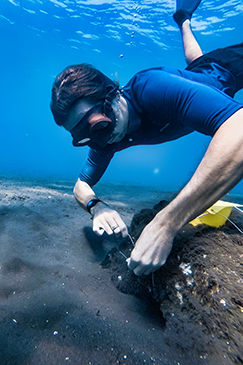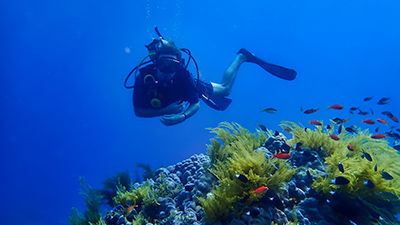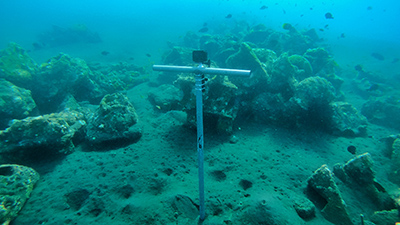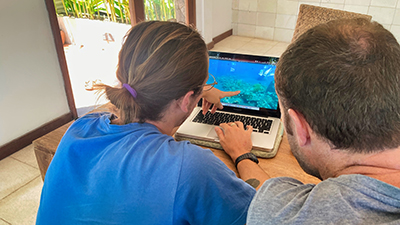プログラム調査日程・空き状況・参加費用等、海外調査に関するお問い合わせは、アースウォッチ・ジャパン事務局にて承ります。info@earthwatch.jp までお気軽にお問い合わせください。
Coral reefs around the world are rapidly disappearing due to climate change and other human impacts. Help researchers investigate whether artificial reef structures can mimic natural coral communities, thereby preserving the biodiversity, ecosystem services, and human communities that rely on coral reefs.

The small Indonesian island of Bali is known for its spectacular forested volcanoes, ancient Hindu temples, and breathtaking beaches. But one of the most alluring draws of this island is just below the ocean’s surface. Bali lies within the ‘coral triangle,’ an area recognized as the global center of marine biodiversity, and its reefs support a dazzling array of wildlife. Over the last several decades, however, Bali’s reef ecosystems have been heavily degraded by destructive fishing practices, warming ocean temperatures, pollution, and other human activities. Now, they’re struggling to survive.
This decline is concerning not only because of the animals that rely on the reef habitats and the important ecosystem functions the reefs perform, but also for the local people who rely on these reefs for their livelihoods, including fishermen and tourism operators. To combat these impacts, scientists are investigating whether artificial reefs could be the answer to preserving biodiversity and ensuring local communities are resilient in the face of climate change.
While natural reef ecosystems can take thousands of years to grow and mature, artificial reefs can be made quickly from concrete and could potentially mimic the important ecological and socio-economic functions of natural reefs. You’ll snorkel or scuba dive* in a Marine Protected Area over both natural coral reefs and artificial reefs, surrounded by corals, sponges, reef fish, turtles, and rays to help researchers determine how closely fish communities, carbon cycling, and predator populations on artificial reefs match those on natural reefs.
On this expedition, you’ll not only witness the destruction that is plaguing reefs all around the world, but you’ll also have the opportunity to contribute to efforts to preserve the biodiversity and ecosystem functions reefs provide. With robust data on the benefits of these structures, the Indonesian government, and governments around the world, will be better able to protect marine biodiversity and safeguard the livelihoods of coastal communities.
*Note: Certification is required for participation on scuba teams. See project briefing for details.
HOW YOU WILL HELP
When you arrive, you’ll be trained in species identification as well as survey methods. You’ll then use those skills to help researchers:

Snorkel (or scuba dive if you’re a member of a scuba team) over artificial and natural reefs to survey biodiversity, conduct photo surveys, and collect nutrient samples (team-dependent).

Deploy remote underwater video (RUV) units to record and monitor wildlife on reefs.

Help evaluate the photos, videos, and water and nutrient samples you collect throughout your expedition and organize the data that has been collected.
